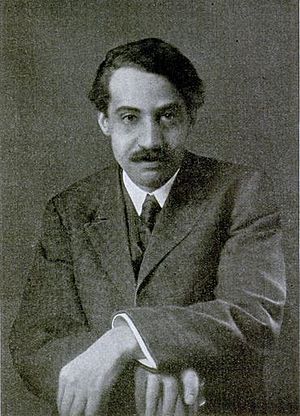William Stanley Braithwaite facts for kids
William Stanley Beaumont Braithwaite (born December 6, 1878 – died June 8, 1962) was an important African-American writer, poet, and literary critic. He was also known for collecting and publishing poems in books called anthologies. His work as a critic and anthologist was highly praised. It played a big role in shaping poetry styles on the East Coast of the United States in the early 1900s.
Contents
William Braithwaite's Life Story
William Braithwaite was born in Boston, Massachusetts in 1878. His father came from a rich family in Guyana, which was then called British Guiana. His mother was the daughter of a formerly enslaved person from North Carolina. William and his siblings were educated at home in a comfortable household.
In 1903, William Braithwaite married Emma Kelly. They had seven children together. He passed away at his home in Harlem, New York, on June 8, 1962, after a short illness.
Starting a Career in Writing
William Braithwaite's father passed away when William was only 12 years old. This meant he had to leave school to help support his family. When he was 15, he started working as a typesetter for a publishing company in Boston called Ginn & Co. A typesetter arranges letters and words for printing. It was there that he discovered his love for poetry and began writing his own poems.
His first poems were published in magazines. Then, in 1904, at age 26, he released his first book of 63 poems, called Lyrics of Life and Love. From 1901 to 1902, he worked as an editor for the Colored American Magazine. By 1906, he became a member of the famous Boston Authors Club.
Writing for Newspapers and Magazines
From 1905 to 1931, Braithwaite wrote for The Boston Evening Transcript newspaper. He wrote articles about poets of his time and an annual review of new poetry. He also wrote for many other well-known magazines and journals. These included Atlantic Monthly, The Nation, The New York Times, and The Crisis. He also started putting together collections of poetry from different historical periods, like the Georgian and Elizabethan eras.
Publishing Annual Poetry Collections
Braithwaite's most important work was creating annual collections of "Magazine Verse." These books, called anthologies, included poems from many different poets. They featured both well-known and new poets, and poems from both popular magazines and smaller, more artistic ones. Each anthology also had an introduction where Braithwaite shared his thoughts on the state of poetry at the time.
These anthologies also listed all the poems published that year. Braithwaite would mark his favorite poems with an asterisk. This helped to show which poems and poets he thought were most important. His anthologies were very successful and grew in size. The first one was 87 pages, but the 15th one was over 1,000 pages long! Even though they were influential, these anthologies did not make a lot of money.
It's interesting to note that while Braithwaite didn't often write about African-American issues in his own poems, his anthologies were special because they included many African-American writers.
Starting Publishing Companies
In 1912, Braithwaite started his own magazine called Poetry Journal. However, he soon handed it over to others. In 1916, he launched another magazine, Poetry Review of America, but it only lasted less than a year.
In 1921, he started a book publishing company called B. J. Brimmer. This company published poetry, non-fiction books, and more anthologies.
Teaching and Later Years
In 1935, Braithwaite became a professor of creative writing at Clark Atlanta University. This was a historically Black university. He retired from teaching in 1945.
In 1946, he and his family moved to Sugar Hill in Harlem, New York. He continued to write and publish poems, essays, and anthologies there.
Role in the Harlem Renaissance
William Braithwaite played a big part in helping poets of the Harlem Renaissance reach a wider audience. The Harlem Renaissance was a time of great artistic and cultural growth for African Americans in the 1920s and 1930s. Even though Braithwaite himself didn't often write about race, his anthologies helped introduce many Black poets to readers everywhere.
For example, in 1927, the poet Countee Cullen dedicated his poetry collection, Caroling Dusk, An Anthology of Negro Poets, to Braithwaite. Another famous writer, James Weldon Johnson, also said that Braithwaite influenced his work.
William Braithwaite's Works
Braithwaite wrote many different types of works, including fiction, poetry, and non-fiction. He also edited many important anthologies.
Fiction Books
- The Canadian (1901)
- The Story of the Great War (1919) - This book was for young readers.
- Going Over Tindal: A Fragment Wrenched From the Life of Titus Jabson (1924) - This was a novel.
Poetry Books
- Lyrics of Life and Love (1904)
- The House of Falling Leaves (1908)
- Selected Poems (1948)
Non-Fiction Books
- The Poetic Year for 1916: A Critical Anthology (1917)
- The Story of the Great War (1919)
- The Bewitched Parsonage: The Story of the Brontës (1950) - This book was about the famous Brontë family of writers.
Anthologies Edited by Braithwaite
Braithwaite was famous for editing many poetry collections. Here are some of them:
- Book of Elizabethan Verse (1906)
- Book of Georgian Verse (1909)
- Book of Restoration Verse (1910)
- Anthology of Magazine Verse (published annually from 1913 to 1929)
- The Golden Treasury of Magazine Verse (1918)
- Victory! Celebrated by Thirty-Eight American Poets (1919)
Awards and Recognition
In 1918, William Braithwaite received the Spingarn Medal. This award is given by the National Association for the Advancement of Colored People (NAACP) to an African American for outstanding achievement.
Where to Find His Work
Many of William Braithwaite's writings and letters are kept in special collections. The Albert and Shirley Small Special Collections Library at the University of Virginia has many of his manuscripts and letters. Harvard University's Houghton Library also has a large collection of letters sent to Braithwaite from other poets.


